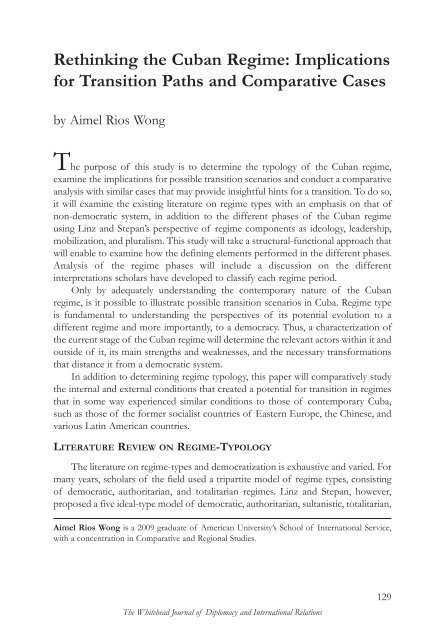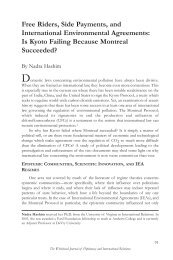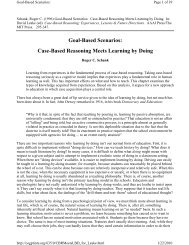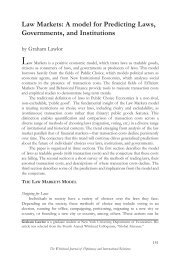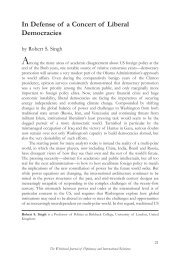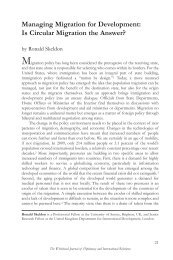Rethinking the Cuban Regime: Implications for Transition Paths and ...
Rethinking the Cuban Regime: Implications for Transition Paths and ...
Rethinking the Cuban Regime: Implications for Transition Paths and ...
Create successful ePaper yourself
Turn your PDF publications into a flip-book with our unique Google optimized e-Paper software.
<strong>Rethinking</strong> <strong>the</strong> <strong>Cuban</strong> <strong>Regime</strong>: <strong>Implications</strong><br />
<strong>for</strong> <strong>Transition</strong> <strong>Paths</strong> <strong>and</strong> Comparative Cases<br />
by Aimel Rios Wong<br />
The purpose of this study is to determine <strong>the</strong> typology of <strong>the</strong> <strong>Cuban</strong> regime,<br />
examine <strong>the</strong> implications <strong>for</strong> possible transition scenarios <strong>and</strong> conduct a comparative<br />
analysis with similar cases that may provide insightful hints <strong>for</strong> a transition. To do so,<br />
it will examine <strong>the</strong> existing literature on regime types with an emphasis on that of<br />
non-democratic system, in addition to <strong>the</strong> different phases of <strong>the</strong> <strong>Cuban</strong> regime<br />
using Linz <strong>and</strong> Stepan’s perspective of regime components as ideology, leadership,<br />
mobilization, <strong>and</strong> pluralism. This study will take a structural-functional approach that<br />
will enable to examine how <strong>the</strong> defining elements per<strong>for</strong>med in <strong>the</strong> different phases.<br />
Analysis of <strong>the</strong> regime phases will include a discussion on <strong>the</strong> different<br />
interpretations scholars have developed to classify each regime period.<br />
Only by adequately underst<strong>and</strong>ing <strong>the</strong> contemporary nature of <strong>the</strong> <strong>Cuban</strong><br />
regime, is it possible to illustrate possible transition scenarios in Cuba. <strong>Regime</strong> type<br />
is fundamental to underst<strong>and</strong>ing <strong>the</strong> perspectives of its potential evolution to a<br />
different regime <strong>and</strong> more importantly, to a democracy. Thus, a characterization of<br />
<strong>the</strong> current stage of <strong>the</strong> <strong>Cuban</strong> regime will determine <strong>the</strong> relevant actors within it <strong>and</strong><br />
outside of it, its main strengths <strong>and</strong> weaknesses, <strong>and</strong> <strong>the</strong> necessary trans<strong>for</strong>mations<br />
that distance it from a democratic system.<br />
In addition to determining regime typology, this paper will comparatively study<br />
<strong>the</strong> internal <strong>and</strong> external conditions that created a potential <strong>for</strong> transition in regimes<br />
that in some way experienced similar conditions to those of contemporary Cuba,<br />
such as those of <strong>the</strong> <strong>for</strong>mer socialist countries of Eastern Europe, <strong>the</strong> Chinese, <strong>and</strong><br />
various Latin American countries.<br />
LITeRATuRe RevIeW on RegIme-TyPoLogy<br />
The literature on regime-types <strong>and</strong> democratization is exhaustive <strong>and</strong> varied. For<br />
many years, scholars of <strong>the</strong> field used a tripartite model of regime types, consisting<br />
of democratic, authoritarian, <strong>and</strong> totalitarian regimes. Linz <strong>and</strong> Stepan, however,<br />
proposed a five ideal-type model of democratic, authoritarian, sultanistic, totalitarian,<br />
Aimel Rios Wong is a 2009 graduate of American University’s School of International Service,<br />
with a concentration in Comparative <strong>and</strong> Regional Studies.<br />
The Whitehead Journal of Diplomacy <strong>and</strong> International Relations<br />
129
130<br />
The Whitehead Journal of Diplomacy <strong>and</strong> International Relations<br />
WOng<br />
<strong>and</strong> post-totalitarian regimes that reflected <strong>the</strong> post-World War II era more<br />
adequately. The nature of each regime type may be defined by examining four<br />
elements: leadership, ideology, mobilization, <strong>and</strong> pluralism. It is worth mentioning<br />
that regime types are mostly based in principles, <strong>and</strong> that actual regimes do not fully<br />
attain all <strong>the</strong> characteristics of a single model. In fact, as explained below, most are<br />
hybrid regimes often presenting a complex set of characteristics from more than one<br />
regime-type that complicates <strong>the</strong>ir classification <strong>and</strong> leads to <strong>the</strong>ir sub-categorization<br />
under <strong>the</strong> ideal models of regime types. Consequently, <strong>the</strong> implications <strong>for</strong> possible<br />
transition paths must take into consideration <strong>the</strong> distinctive features <strong>and</strong> possibly<br />
hybrid components of <strong>the</strong> regime.<br />
According to Linz <strong>and</strong> Stepan, democracies rein<strong>for</strong>ce extensive economical,<br />
societal, <strong>and</strong> organizational pluralist autonomy consistent with “societal<br />
corporatism.” They profess an extensive intellectual commitment to citizenship,<br />
respect citizens’ individual rights, <strong>and</strong> <strong>the</strong> rule of law. Democracies place high value<br />
on low regime mobilization <strong>and</strong> high citizen participation via autonomously<br />
generated organization of civil society <strong>and</strong> competing political parties guaranteed by<br />
a system of law. Finally, <strong>the</strong>y exercise free, periodic elections within constitutional<br />
limits <strong>and</strong> <strong>the</strong> rule of law. 1<br />
There are, however, several hybrid models of democratic regimes. Many<br />
countries settle <strong>for</strong> illiberal versions of democracy, in which <strong>the</strong> system does not fully<br />
TheRe mAy be<br />
hybRId RegImes<br />
ThAT CombIne<br />
demoCRATIC And<br />
AuThoRITARIAn<br />
eLemenTs.<br />
seek to protect <strong>the</strong> rule of law, separation of powers, <strong>and</strong><br />
basic liberties of speech, assembly, religion, <strong>and</strong> property. 2<br />
They may also become delegative democracies, in which<br />
through clean, but highly emotional elections a majority<br />
<strong>for</strong>ms <strong>and</strong> empowers a leader that typically present itself<br />
as above political parties <strong>and</strong> organized interests in a<br />
system of very weak or nonexistent horizontal<br />
accountability. 3 In addition, <strong>the</strong>re may be hybrid regimes<br />
that combine democratic <strong>and</strong> authoritarian elements.<br />
These regimes are deliberately pseudodemocratic; where<br />
<strong>for</strong>mally democratic political institutions, such as multiparty electoral competition,<br />
mask <strong>the</strong> reality of authoritarian domination. 4<br />
The literature on non-democratic regimes has long included discussions on <strong>the</strong><br />
nature of authoritarian regimes. Linz <strong>and</strong> Stepan argue that authoritarianism<br />
possesses limited <strong>and</strong> irresponsible political pluralism, <strong>and</strong> often quite extensive<br />
social <strong>and</strong> economic pluralism. Authoritarian regimes do not possess an elaborate<br />
<strong>and</strong> guiding ideology, <strong>and</strong> only exercise political mobilization at some point in <strong>the</strong>ir<br />
development. Its leaders exercise power within <strong>for</strong>mally ill-defined but actually quite<br />
predictable norms. 5<br />
There may be subtypes of this model, such as bureaucratic-authoritarianism.<br />
This typology of regime has as its principal social base <strong>the</strong> upper bourgeoisie <strong>and</strong> is<br />
directed by specialists in technology <strong>and</strong> coercion. Moreover, it involves <strong>the</strong> political<br />
<strong>and</strong> economic exclusion of <strong>the</strong> popular sectors, suppresses basic rights of citizenship
REThInkIng ThE CUbAn REgIME<br />
<strong>for</strong> much of <strong>the</strong> population, <strong>and</strong> increases transnationalization of <strong>the</strong> productive<br />
structure <strong>and</strong> <strong>the</strong> depolitization of social issues. 6<br />
Sultanistic regimes can be characterized by <strong>the</strong> following words: personal,<br />
corrupt, destructive, <strong>and</strong> chaotic. These regimes, in which <strong>the</strong> ruler operates<br />
primarily based on personal discretion, were identified as a distinct typology after<br />
multiple existences of such rule. 7 In sultanistic regimes, economic <strong>and</strong> social<br />
pluralism is subject to unpredictable <strong>and</strong> despotic intervention from <strong>the</strong> sultan’s<br />
despotic power. This regime type has no guiding ideology, but ra<strong>the</strong>r an extreme<br />
glorification of <strong>the</strong> ruler <strong>and</strong> a highly arbitrary manipulation of symbols. It involves<br />
occasional, low <strong>and</strong> ceremonial mobilization led by coercive <strong>and</strong> clientelist methods<br />
without permanent organization. Sultanistic leaders are highly personalistic <strong>and</strong><br />
arbitrary. They possess strong dynastic tendencies <strong>and</strong> its staff ’s position derives<br />
from <strong>the</strong>ir purely personal submission to <strong>the</strong> ruler. 8 Sultanistic regimes are different<br />
from authoritarian regimes <strong>and</strong> o<strong>the</strong>r <strong>for</strong>ms of non-democratic rule in <strong>the</strong> rulers’<br />
overall conception of politics, <strong>the</strong> structure of power, <strong>and</strong> <strong>the</strong> relation to <strong>the</strong> social<br />
structure, <strong>the</strong> economy, <strong>and</strong> <strong>the</strong> subjects of <strong>the</strong> sultanistic rule.<br />
Ano<strong>the</strong>r type of non-democratic regime is totalitarianism. Totalitarian regimes<br />
have an “exclusive, autonomous, <strong>and</strong> more or less intellectually elaborate ideology<br />
with which <strong>the</strong> ruling group or leader, <strong>and</strong> <strong>the</strong> party serving <strong>the</strong> leaders, identify <strong>and</strong><br />
which <strong>the</strong>y use as a basis <strong>for</strong> policies or manipulate to legitimize <strong>the</strong>m.” 9 The guiding<br />
ideology goes beyond a particular program or definition of <strong>the</strong> boundaries of<br />
legitimate political action to provide a reachable utopia. Totalitarian systems<br />
encourage, dem<strong>and</strong>, reward, <strong>and</strong> channel citizen mobilization <strong>for</strong> political <strong>and</strong><br />
collective tasks through a vast network of regime-created, party-led obligatory<br />
organizations <strong>for</strong> political <strong>and</strong> collective mobilization that belittles private life.<br />
Totalitarian leaders, rarely charismatic, rule with undefined limits <strong>and</strong> great<br />
unpredictability <strong>and</strong> rise to power from success <strong>and</strong> commitment in <strong>the</strong> party. They<br />
concentrate vast amounts of power <strong>and</strong> are object of a cult of personality. It is worth<br />
mentioning that even though such a leader is highly probable in a totalitarian system,<br />
his existence is not necessary <strong>for</strong> regime stability. As Linz points out, succession<br />
crisis that were thought to threaten <strong>the</strong> stability <strong>and</strong> survival of a totalitarian regime<br />
“have not led to <strong>the</strong>ir downfall or breakdown even when <strong>the</strong>y have been very critical<br />
<strong>for</strong> <strong>the</strong>m.” 10 Thus, changes in <strong>the</strong> relationship between leadership, ideology, <strong>and</strong><br />
mobilization are <strong>the</strong> elements likely to offer <strong>the</strong> best clue <strong>for</strong> <strong>the</strong> construction of <strong>the</strong><br />
typology of totalitarian regimes, as well as <strong>for</strong> <strong>the</strong>ir consolidation, stability, change,<br />
<strong>and</strong> possibly even <strong>the</strong>ir breakdown.<br />
Finally, Linz <strong>and</strong> Stepan conceptualized post-totalitarianism as a regime type that<br />
requires <strong>the</strong> pre-existence of a totalitarian state. Post-totalitarianism may emerge <strong>and</strong><br />
evolve as <strong>the</strong> result of three distinct but interconnected processes. Firstly, <strong>the</strong>y come<br />
about as a result of deliberate policies of <strong>the</strong> rulers to soften or re<strong>for</strong>m <strong>the</strong><br />
totalitarian system (detotalitarianism by choice). Secondly, <strong>the</strong>y emerge from <strong>the</strong><br />
internal erosion of <strong>the</strong> structures of <strong>the</strong> totalitarian regime <strong>and</strong> of <strong>the</strong> cadres’<br />
ideological belief in <strong>the</strong> system (detotalitarianism by decay). Thirdly, <strong>the</strong>y manifest<br />
www.journalofdiplomacy.org<br />
131<br />
Summer/Fall 2010
132<br />
The Whitehead Journal of Diplomacy <strong>and</strong> International Relations<br />
WOng<br />
through <strong>the</strong> creation of social, cultural, <strong>and</strong> even economic spaces that resist or<br />
escape totalitarian control (detotalitarianism by societal conquest). 11<br />
In post-totalitarian regimes, although <strong>the</strong>re is almost no political pluralism<br />
because <strong>the</strong> party still monopolizes power, a “second economy” may exist with <strong>the</strong><br />
overwhelming presence of <strong>the</strong> state. Post-totalitarian regimes experience a higher<br />
degree of social pluralism that is simultaneously a source of regime vulnerability <strong>and</strong><br />
a dynamic source of strength <strong>for</strong> <strong>the</strong> growing democratic opposition. Ideology exists<br />
as part of social reality, but decision-making is based on pragmatic consensus ra<strong>the</strong>r<br />
than on ideology. Post-totalitarian regimes, in contrast to totalitarian ones, exhibit a<br />
decrease in <strong>the</strong> interest of mobilization, which conduces to boredom, withdrawal,<br />
<strong>and</strong> ultimately privatization of <strong>the</strong> population. Finally, while totalitarian leaders are<br />
often charismatic, rule with undefined limits <strong>and</strong> great unpredictability, <strong>and</strong> rise to<br />
power from success <strong>and</strong> commitment in <strong>the</strong> party, post-totalitarian leaders are rarely<br />
charismatic, emphasize personal security <strong>and</strong> may rise to power from <strong>the</strong> state<br />
apparatus ra<strong>the</strong>r than solely from <strong>the</strong> party organization. 12<br />
The hIsToRICAL eRA of The CubAn RegIme<br />
The historical process in which <strong>the</strong> <strong>Cuban</strong> nation embarked in 1959 has been<br />
anything but monolithic. In fact, it is difficult to imagine a political regime whose<br />
internal dynamics have remained static <strong>and</strong> managed to survive <strong>for</strong> so long. The<br />
<strong>for</strong>thcoming analysis will discuss <strong>the</strong> various changes experienced by <strong>the</strong> <strong>Cuban</strong><br />
regime through its more than fifty years of existence.<br />
The Radical Experiment (1959-1970):<br />
Charismatic authority, vanguard politics, <strong>the</strong> closing of pluralism, <strong>and</strong> <strong>the</strong><br />
emergence of <strong>the</strong> politics of mass mobilization characterized <strong>the</strong> first phase in <strong>the</strong><br />
historical era of <strong>the</strong> regime. Those elements served <strong>the</strong> revolutionary government o<br />
attempt at creating a sui generis model of socialism in Cuba, <strong>and</strong> at record speed<br />
achieve economic development <strong>and</strong> industrialization.<br />
Shortly after <strong>the</strong> triumph of <strong>the</strong> Revolution on January 1, 1959, <strong>Cuban</strong> politics<br />
began to acquire <strong>the</strong> contours of a one-party system with a nationalist character. The<br />
consolidation of this nationalist revolution led Cuba to socialism, an alliance with <strong>the</strong><br />
Soviet Union <strong>and</strong> permanent hostility towards <strong>the</strong> United States. by 1961, <strong>the</strong><br />
revolution had radicalized <strong>and</strong> consolidated around <strong>the</strong> charismatic figure of Fidel<br />
Castro. For <strong>the</strong> sake of survival as a nation, unity behind <strong>the</strong> maximum leader would<br />
be iron h<strong>and</strong>edly en<strong>for</strong>ced from <strong>the</strong>n on, as <strong>the</strong> dynamics of Fidel-mo<strong>the</strong>rl<strong>and</strong>revolution<br />
became <strong>the</strong> basis <strong>for</strong> governance <strong>and</strong> legitimacy. 13<br />
Accordingly, during <strong>the</strong> 1960s revolutionary Cuba embarked in a period of<br />
“radical experiment” of national economic development <strong>and</strong> <strong>the</strong> trans<strong>for</strong>mation of<br />
society under socialism. Cuba was not to follow <strong>the</strong> traditional frameworks of<br />
previous social revolutions, Fidel Castro stated; it would create a sui generis socialism,<br />
based on <strong>the</strong> socialization of all means of production, rapid industrialization, <strong>and</strong> <strong>the</strong><br />
creation of a new man that would selflessly dedicate to tasks that <strong>the</strong> revolution
REThInkIng ThE CUbAn REgIME<br />
would dem<strong>and</strong> of him.<br />
The new socialist model redefined <strong>the</strong> concept of pluralism. All political<br />
organizations but those that were part of <strong>the</strong> government were banned, <strong>and</strong> in 1965,<br />
its leadership created <strong>the</strong> <strong>Cuban</strong> Communist Party as <strong>the</strong> only legally recognized<br />
political party. The nationalization of all <strong>for</strong>eign <strong>and</strong> <strong>Cuban</strong>-owned businesses<br />
signaled a disappearance of private economic activity in <strong>the</strong> h<strong>and</strong>s of <strong>the</strong> state. The<br />
press, sports, <strong>and</strong> o<strong>the</strong>r expressions of cultural life also acquired a “revolutionary”<br />
meaning. 14<br />
The remaking of society as a radical experiment brought in ano<strong>the</strong>r<br />
characteristic that dominated <strong>the</strong> <strong>Cuban</strong> regime since its initial years: popular<br />
mobilization. Mobilizing a large part of <strong>the</strong> population was necessary to link<br />
revolutionary trans<strong>for</strong>mation, elite control,<br />
<strong>and</strong> political mobilization. The regime<br />
established a number of mass organizations<br />
to protect <strong>the</strong> government from <strong>for</strong>eign <strong>and</strong><br />
counterrevolutionary threats <strong>and</strong> attacks,<br />
provide a means <strong>for</strong> <strong>the</strong> state to influence,<br />
shape, <strong>and</strong> control <strong>the</strong> society, <strong>and</strong> to<br />
mobilize <strong>the</strong> population <strong>for</strong> any purpose.<br />
These included <strong>the</strong> Committees <strong>for</strong> <strong>the</strong><br />
Defense of <strong>the</strong> Revolution (CDR) <strong>and</strong> <strong>the</strong><br />
Federation of <strong>Cuban</strong> Women (FMC), <strong>and</strong><br />
<strong>the</strong> newly trans<strong>for</strong>med Confederation of<br />
<strong>Cuban</strong> Workers (CTC). 15<br />
At <strong>the</strong> expense of vigilance, <strong>the</strong> mass mobilization system sacrificed<br />
organizational autonomy <strong>and</strong> adaptability <strong>and</strong> became an extension of <strong>the</strong> political<br />
style of Fidel Castro. The top leadership of <strong>the</strong> mass organizations served at Fidel<br />
Castro’s discretion; he determined <strong>the</strong> concerns of <strong>the</strong> organizations more than by<br />
<strong>the</strong> people <strong>the</strong>mselves. 16 In fact, charismatic authority <strong>and</strong> popular mobilization<br />
crystallized <strong>the</strong> politics of <strong>the</strong> new Cuba. 17 Unity <strong>for</strong> <strong>the</strong> sake of defending national<br />
sovereignty required unconditional support to Fidel Castro, who required <strong>the</strong><br />
mobilization of <strong>the</strong> <strong>Cuban</strong> people in defending <strong>the</strong> nation <strong>and</strong> developing <strong>the</strong><br />
economy. Under this political dynamic, dissent was intolerable, <strong>and</strong> equitable with<br />
treason.<br />
Developing <strong>the</strong> economy was <strong>the</strong> main priority of <strong>the</strong> revolution. Economic<br />
success was <strong>the</strong> only avenue <strong>for</strong> <strong>the</strong> radical experiment. Fidel Castro <strong>and</strong> o<strong>the</strong>r<br />
revolutionary leaders set an unprecedented goal <strong>for</strong> <strong>the</strong> <strong>Cuban</strong> economy: producing<br />
10 million metric tons of sugar during <strong>the</strong> 1970 sugar harvest. To succeed, workers<br />
from all sectors <strong>and</strong> occupations were to contribute to achieving <strong>the</strong> sugar<br />
production goal. In spite of such ef<strong>for</strong>ts, <strong>Cuban</strong> workers did not respond as desired<br />
to moral incentives <strong>and</strong> appeals to work <strong>for</strong> <strong>the</strong> collective good of society. They<br />
covertly sabotaged production through absenteeism, foot-dragging, <strong>and</strong> even<br />
breaking machinery to halt production entirely. Economic production fell below <strong>the</strong><br />
www.journalofdiplomacy.org<br />
133<br />
The RemAkIng of<br />
soCIeTy As A RAdICAL<br />
exPeRImenT bRoughT In<br />
AnoTheR ChARACTeRIsTIC<br />
ThAT domInATed The<br />
CubAn RegIme sInCe ITs<br />
InITIAL yeARs: PoPuLAR<br />
mobILIzATIon.<br />
Summer/Fall 2010
134<br />
The Whitehead Journal of Diplomacy <strong>and</strong> International Relations<br />
WOng<br />
set targets during 1967-1970. Cuba did not achieve its 10 million tons of sugar <strong>and</strong><br />
<strong>the</strong> ef<strong>for</strong>t destroyed <strong>the</strong> rest of its economy. 18<br />
Economic failure, however, did not just occur <strong>for</strong> ideological reasons. Fidel<br />
Castro clearly overestimated his ability to remake society; learning at a very high cost<br />
<strong>the</strong> limits of his charisma. 19 Cuba had to ab<strong>and</strong>on its aspiration of establishing a sui<br />
generis socialism <strong>and</strong> was <strong>for</strong>ced to look to <strong>the</strong> institutionalized systems of Eastern<br />
Europe <strong>and</strong> <strong>the</strong> USSR <strong>for</strong> models.<br />
The Institutionalization Phase (1970-1985):<br />
The second phase of <strong>the</strong> <strong>Cuban</strong> regime was characterized by an ef<strong>for</strong>t to<br />
institutionalize Fidel Castro’s charisma in <strong>the</strong> dynamics of <strong>the</strong> organizations of <strong>the</strong><br />
Revolution, such as <strong>the</strong> Communist Party of Cuba (PCC) <strong>and</strong> <strong>the</strong> mass mobilization<br />
organizations.<br />
During <strong>the</strong> 1970s, <strong>the</strong> government focused on economic recovery <strong>and</strong> on<br />
seeking more technical assistance from <strong>the</strong> USSR <strong>and</strong> Eastern European socialist<br />
countries. From <strong>the</strong> early 1970s until <strong>the</strong> mid-1980s, <strong>the</strong> revolutionary leadership<br />
implemented certain market oriented re<strong>for</strong>ms <strong>and</strong> mechanisms within state<br />
enterprises, such as employee bonuses, <strong>the</strong> authorization of private farmers markets,<br />
credit lines, <strong>and</strong> <strong>the</strong> opportunity to open bank accounts <strong>and</strong> accumulate interest<br />
rates, to enhance productivity. In effect, <strong>the</strong> regime sought to ab<strong>and</strong>on <strong>the</strong> inspired<br />
principles of increasing working production through moral incentives <strong>and</strong><br />
competition among workers <strong>and</strong> economic sectors in Cuba <strong>and</strong> embraced <strong>the</strong> use of<br />
material incentives based on a market economy as employed by Eastern bloc<br />
countries.<br />
In 1975, <strong>the</strong> regime established a communist constitution that declared Cuba an<br />
a<strong>the</strong>ist state <strong>and</strong> <strong>the</strong> PCC as <strong>the</strong> vanguard<br />
The ChIef CLAIm To<br />
LegITImATe RuLe In<br />
CubA, Though, deRIved<br />
noT fRom eLeCTIons buT<br />
fRom The quALITy of<br />
The RuLeRs And The WAy<br />
They RuLed In The<br />
ImAge of TheIR mAxImum<br />
LeAdeR.<br />
party of society. Moreover, it called <strong>for</strong> a<br />
national Assembly of <strong>the</strong> People’s Power<br />
whose representatives would in turn elect<br />
members to <strong>the</strong> Council of States <strong>and</strong><br />
Ministers. Once established, <strong>the</strong> national<br />
Assembly of <strong>the</strong> People’s Power unanimously<br />
elected Fidel Castro as <strong>the</strong> President of <strong>the</strong><br />
Council of State <strong>and</strong> Minister, <strong>and</strong> his bro<strong>the</strong>r<br />
Raul as its First Vice-President. As a result, by<br />
<strong>the</strong> late 1970s, Fidel Castro had delegated<br />
considerable power to about eighteen<br />
members of <strong>the</strong> Council of State <strong>and</strong><br />
Ministers, thus moving <strong>the</strong> government away<br />
from <strong>the</strong> absolute predominance of a single individual toward a more oligarchic<br />
rule. 20<br />
The chief claim to legitimate rule in Cuba, though, derived not from elections<br />
but from <strong>the</strong> quality of <strong>the</strong> rulers <strong>and</strong> <strong>the</strong> way <strong>the</strong>y ruled in <strong>the</strong> image of <strong>the</strong>ir
REThInkIng ThE CUbAn REgIME<br />
maximum leader. The pervasive domination of charismatic versus institutionalized<br />
governance would prove detrimental in making <strong>the</strong> PCC, or any o<strong>the</strong>r state<br />
institution or official, <strong>the</strong> most relevant actor within <strong>the</strong> regime, as will be<br />
demonstrated.<br />
Pluralism continued to be bound to exist within <strong>the</strong> Revolution. As in <strong>the</strong> radical<br />
experiment, political autonomy continued to be rare, <strong>and</strong> political competition<br />
remained very limited, since opposition to prevailing policies <strong>and</strong> ideology was<br />
impossible. All political mobilizations were conducted by <strong>and</strong> <strong>for</strong> organizations loyal<br />
to <strong>the</strong> regime because <strong>the</strong>re was no legal organized opposition allowed. 21<br />
by <strong>the</strong> mid-1980s, <strong>the</strong> effects of <strong>the</strong> market-oriented re<strong>for</strong>ms introduced in <strong>the</strong><br />
early 1970s had alarmed <strong>the</strong> top revolutionary leaders, including Fidel Castro. In<br />
1986, he publicly denounced <strong>the</strong> proliferation of corruption <strong>and</strong> <strong>the</strong> rise of<br />
profiteers among rank-<strong>and</strong>-file workers, managers, <strong>and</strong> even among high-level<br />
government officials. Castro denounced a lack of proletariat conscience among<br />
workers, <strong>and</strong> emphasized <strong>the</strong> need to increase ideological education to workers, new<br />
party cadres, <strong>and</strong> intermediary officials of mass mobilization organizations. The<br />
relative economic liberalization <strong>and</strong> decentralization that occurred during <strong>the</strong><br />
institutionalization process ran counter to <strong>the</strong> precepts of <strong>the</strong> revolution. Thus, Fidel<br />
Castro sanctioned a new program of “moral renewal” <strong>and</strong> economic restructuring:<br />
a rectification process based on <strong>the</strong> return to correct proletariat conscience.<br />
The Rectification Phase (1986-1990):<br />
The rectification process curbed <strong>the</strong> market-oriented re<strong>for</strong>ms that were<br />
implemented during <strong>the</strong> institutionalization phase <strong>and</strong> reaffirmed <strong>the</strong> central role of<br />
<strong>the</strong> PCC. It emphasized <strong>the</strong> importance of correct proletariat conscience <strong>and</strong> mass<br />
mobilization as levers to achieve savings <strong>and</strong> improve productivity. In addition, it was<br />
characterized by <strong>the</strong> preeminence of Fidel Castro’s charismatic leadership <strong>and</strong> a<br />
reversal to <strong>the</strong> practices of <strong>the</strong> radical experiment.<br />
Ideologically speaking, <strong>the</strong> rectification process evoked <strong>the</strong> radical experiment of<br />
<strong>the</strong> 1960s. 22 Despite its rhetoric, though, <strong>the</strong> government aggressively pursued<br />
Western economic ties <strong>and</strong> initiated new <strong>for</strong>ms of economic capitalist ownership,<br />
such as signing joint venture agreements with Western companies <strong>and</strong> increasing <strong>the</strong><br />
number of sociedades anónimas, state agencies that operated with semi-autonomy from<br />
day-to-day budgetary constraints at home <strong>and</strong> abroad, <strong>for</strong> profit <strong>and</strong> hard currency.<br />
As Eckstein points out, <strong>the</strong> process of rectification in actuality deviated from <strong>and</strong><br />
even contradicted its ideological rhetoric. On one h<strong>and</strong>, <strong>the</strong> government resurrected<br />
past moral principles; on <strong>the</strong> o<strong>the</strong>r, it implemented certain re<strong>for</strong>ms <strong>and</strong> allowed<br />
market-oriented practices that undermined revolutionary gains. government policies<br />
aimed at obtaining hard currency <strong>and</strong> address fiscal <strong>and</strong> political concerns. Ideology<br />
was not <strong>the</strong> driving <strong>for</strong>ce of <strong>the</strong> rectification process. 23<br />
Although <strong>the</strong> PCC had acquired <strong>the</strong> basic profile of <strong>the</strong> old communist parties<br />
of Eastern Europe <strong>and</strong> USSR by <strong>the</strong> mid-1980s, it did not achieve <strong>the</strong><br />
institutionalization necessary to steer politics in a different direction. Fidel Castro<br />
www.journalofdiplomacy.org<br />
135<br />
Summer/Fall 2010
136<br />
The Whitehead Journal of Diplomacy <strong>and</strong> International Relations<br />
WOng<br />
remained at <strong>the</strong> center of <strong>Cuban</strong> politics <strong>and</strong> <strong>the</strong> party had not been able to<br />
institutionalize his charisma. The fact that <strong>the</strong> rectification process was an initiative<br />
of Fidel Castro <strong>and</strong> not of <strong>the</strong> PCC was testimony to its institutional weakness. The<br />
PCC still depended on Fidel Castro <strong>and</strong> thus could not challenge his authority or <strong>the</strong><br />
logic of <strong>the</strong> process that he sought to bring about. 24 Similarly, mass mobilization<br />
organizations aptly responded to Fidel’s call to rectify negative tendencies within <strong>the</strong><br />
Revolution.<br />
As in previous phases, <strong>the</strong> rectification process failed to acknowledge pluralism<br />
outside <strong>the</strong> revolution. The impossibility to challenge <strong>the</strong> monopolistic authority of<br />
<strong>the</strong> party <strong>and</strong> leadership of Fidel Castro led workers, party cadres, <strong>and</strong> even highlevel<br />
government officials to use indirect methods of resistance <strong>and</strong> protest,<br />
including foot-dragging, work absenteeism, corruption, <strong>and</strong> a wide range of o<strong>the</strong>r<br />
illicit activities as modes of channeling <strong>the</strong>ir discontent. The need <strong>for</strong> elite allegiance<br />
resulted in <strong>the</strong> tolerance of illicit behavior among high-ranking officials. Maintaining<br />
elite unity behind <strong>the</strong> maximum leader was necessary at all costs; any attempt against<br />
it was severely punished.<br />
In addition to <strong>the</strong> a<strong>for</strong>ementioned problems, <strong>the</strong> international scenario became<br />
fully unfavorable to <strong>the</strong> <strong>Cuban</strong> regime. The fall of communism in Eastern Europe<br />
<strong>and</strong> <strong>the</strong> USSR altered <strong>the</strong> balance of power against <strong>the</strong> <strong>Cuban</strong> revolution, <strong>and</strong><br />
delivered such a severe political <strong>and</strong> economic blow that <strong>the</strong> regime was <strong>for</strong>ced to<br />
shift its priorities <strong>and</strong> focus on its political survival like never be<strong>for</strong>e.<br />
fITTIng The hIsToRICAL eRA In RegIme TyPoLogy<br />
<strong>Cuban</strong> scholars divert when in determining <strong>the</strong> typology of <strong>the</strong> <strong>Cuban</strong> regime<br />
during its historical phases. Perez-Stable contends that during <strong>the</strong> institutionalization<br />
<strong>and</strong> rectification periods <strong>the</strong> regime fit <strong>the</strong> model of mobilizational authoritarianism,<br />
concluding that <strong>the</strong> process of institutionalization “never reached an irreversible<br />
momentum.” 25<br />
In turn, Mesa Lago states that <strong>the</strong> <strong>Cuban</strong> regime had become totalitarian after<br />
1961 <strong>and</strong> did not experience any qualitative changes of sufficient magnitude during<br />
<strong>the</strong> subsequent years to classify it as a different regime type. 26 Dominguez argues that<br />
<strong>the</strong> radical experiment during <strong>the</strong> 1960s made Cuba a totalitarian regime that<br />
consolidated its institutions in <strong>the</strong> 1970s <strong>and</strong> 1980s, becoming a bureaucratic socialist<br />
system. 27<br />
In contrast, Mujal-Leon <strong>and</strong> busby argue that during <strong>the</strong> institutionalization<br />
period <strong>the</strong> <strong>Cuban</strong> regime had reached a deeply intertwined relation with <strong>the</strong> Soviet<br />
Union; <strong>and</strong>, as it assumed its part in <strong>the</strong> socialist division of labor, it began to<br />
experience a transition towards early post-totalitarianism. however, <strong>the</strong> authors<br />
believe that Fidel Castro’s foundational <strong>and</strong> personalistic leadership, <strong>the</strong> continued<br />
vitality of regime ideology, <strong>and</strong> institutional weakness truncated such transition. 28<br />
I contend Mujal-Leon <strong>and</strong> busby’s interpretation precisely <strong>for</strong> <strong>the</strong> very factors<br />
that <strong>the</strong>y account <strong>for</strong> <strong>the</strong> truncation of a post-totalitarian trans<strong>for</strong>mation. The<br />
preeminence of a vital <strong>and</strong> guiding ideology, <strong>the</strong> charismatic leadership of Fidel
REThInkIng ThE CUbAn REgIME<br />
Castro, a lack of social <strong>and</strong> economic pluralism, <strong>and</strong> continued reliance on high levels<br />
of mass mobilization do not substantiate any evidence to believe that a transition to<br />
post-totalitarianism was underway. Moreover, <strong>the</strong> market-oriented re<strong>for</strong>ms that<br />
began in <strong>the</strong> 1970s took place within <strong>the</strong> boundaries of totalitarianism <strong>and</strong> were<br />
nei<strong>the</strong>r irrational nor inconsistent with <strong>the</strong> regime’s ideology <strong>and</strong> its sui generis<br />
socialism. 29 Thus, <strong>the</strong> <strong>Cuban</strong> regime was totalitarian during its historical phase <strong>and</strong><br />
<strong>the</strong> changes that took place occurred within <strong>the</strong> same regime type. On <strong>the</strong> o<strong>the</strong>r<br />
h<strong>and</strong>, <strong>the</strong> trans<strong>for</strong>mations that occurred in <strong>the</strong> 1990s altered state-society dynamics<br />
so dramatically, that <strong>the</strong>y are worth analyzing as to advance our discussion on <strong>the</strong><br />
present nature of <strong>the</strong> regime <strong>and</strong> <strong>the</strong> prospects <strong>for</strong> transition paths.<br />
The ConTemPoRARy eRA of The CubAn RegIme<br />
In 1990, <strong>the</strong> crisis created by <strong>the</strong> collapse of <strong>the</strong> Soviet Union led Fidel Castro<br />
to declare a “Special Period in Times of Peace,” in which <strong>Cuban</strong>s were called to make<br />
unprecedented sacrifices to “save <strong>the</strong> revolution.” This event marks <strong>the</strong> beginning of<br />
what I refer to as <strong>the</strong> contemporary era of <strong>the</strong> regime, which encompasses <strong>the</strong><br />
present. The first phase of <strong>the</strong> contemporary era was <strong>the</strong> Special Period. It is<br />
important to note that <strong>the</strong> year chosen as <strong>the</strong> end of <strong>the</strong> Special Period reflects <strong>the</strong><br />
analytical purposes of this paper ra<strong>the</strong>r than <strong>the</strong> actual date in which <strong>the</strong> profound<br />
political, economic, <strong>and</strong> social crisis ended.<br />
The Special Period (1991-2006)<br />
As a result of <strong>the</strong> collapse of <strong>the</strong> Soviet Union, Cuba lost $4 billion in annual<br />
subsidies or <strong>the</strong> equivalent of nearly 30 percent of its gDP. From 1989 to 1993,<br />
Cuba’s real gDP dropped by nearly 35<br />
percent. Open unemployment <strong>and</strong><br />
underemployment accounted <strong>for</strong> only<br />
40 percent of <strong>the</strong> economically active<br />
population in 1994, even as <strong>the</strong> official<br />
unemployment statistics showed<br />
unemployment at less than 10<br />
percent. 30 Fuel scarcity resulted in six<br />
to eight hours of daily blackouts,<br />
transportation problems, <strong>and</strong> factory<br />
stoppages. As a result, in 1994,<br />
hundreds of <strong>Cuban</strong>s staged a<br />
spontaneous demonstration in<br />
havana’s boardwalk, <strong>the</strong> largest<br />
defiance to <strong>the</strong> regime in thirty years.<br />
Although a Tiananmen Square<br />
scenario did not occur, <strong>Cuban</strong>s sent a clear message of discontent to <strong>the</strong> regime. 31<br />
In August 1993, Fidel Castro responded by announcing a package of measures<br />
www.journalofdiplomacy.org<br />
137<br />
In 1994, hundReds of CubAns<br />
sTAged A sPonTAneous<br />
demonsTRATIon In hAvAnA’s<br />
boARdWALk, The LARgesT<br />
defIAnCe To The RegIme In<br />
ThIRTy yeARs. ALThough A<br />
TIAnAnmen squARe sCenARIo<br />
dId noT oCCuR, CubAns senT<br />
A CLeAR messAge of<br />
dIsConTenT To The RegIme.<br />
Summer/Fall 2010
138<br />
The Whitehead Journal of Diplomacy <strong>and</strong> International Relations<br />
WOng<br />
that included legalizing <strong>the</strong> possession <strong>and</strong> use of dollars, including remittances,<br />
authorizing certain types of self-employment, <strong>the</strong> conversion of state farms into<br />
cooperatives, allowing greater <strong>for</strong>eign investment, encouraging joint ventures, <strong>and</strong><br />
establishing free trade zones. 32 The FAR received more control over <strong>the</strong> economy,<br />
extending its role from agricultural production to <strong>the</strong> management of joint ventures<br />
with <strong>for</strong>eign investors in <strong>the</strong> profitable tourism sector.<br />
While <strong>the</strong>se changes made <strong>the</strong> <strong>Cuban</strong> regime resemble an authoritarian system,<br />
its continued reliance on a guiding ideology <strong>and</strong> mass mobilization <strong>and</strong> <strong>the</strong> pervasive<br />
lack of pluralism strongly refute such characterization. Mujal Leon <strong>and</strong> busby’s<br />
categorization of <strong>the</strong> regime as charismatic post-totalitarian more aptly describes <strong>the</strong><br />
regime’s evolution in <strong>the</strong> realms of leadership, mobilization, ideology, <strong>and</strong> pluralism.<br />
Under this unique version of post-totalitarianism, Fidel Castro, as <strong>the</strong><br />
charismatic founder of <strong>the</strong> regime, retained broad power <strong>and</strong> influence. no one<br />
within <strong>the</strong> elite questioned ei<strong>the</strong>r his role or, ultimately,<br />
To suRvIve In<br />
C o n T e m P o R A R y<br />
CubA CubAns hAd<br />
To ConsTAnTLy<br />
bReAk The LAW And<br />
ITs IdeoLogICAL<br />
undeRPInnIngs.<br />
his decisions, including regime re<strong>for</strong>mers. Fidel Castro<br />
continued to exercise a military-like <strong>for</strong>m of authority<br />
over <strong>the</strong> PCC, <strong>the</strong> FAR, <strong>and</strong> <strong>the</strong> mass mobilization<br />
organizations, which he used to mobilize <strong>the</strong> <strong>Cuban</strong><br />
population <strong>and</strong> to transmit ideological directives. 33<br />
Even though Castro tried to keep ideological deviation<br />
within narrow b<strong>and</strong>s, signs of erosion became visible<br />
within <strong>Cuban</strong> society. To survive in contemporary<br />
Cuba <strong>Cuban</strong>s had to constantly break <strong>the</strong> law <strong>and</strong> its<br />
ideological underpinnings. As <strong>the</strong> gap between<br />
socialist promise <strong>and</strong> per<strong>for</strong>mance widened, <strong>the</strong><br />
regime lost more of its credibility <strong>and</strong> legitimacy. 34 never<strong>the</strong>less, <strong>the</strong> sustained<br />
commitment of Fidel Castro <strong>and</strong> his inner circle of loyalists to <strong>the</strong> utopian vision<br />
remained far greater than one would expect in a post-totalitarian regime.<br />
The Special Period partially con<strong>for</strong>med to a decline in <strong>the</strong> willingness <strong>and</strong><br />
capacity of <strong>the</strong> regime to mobilize <strong>the</strong> population. <strong>Cuban</strong>s, especially <strong>the</strong> younger<br />
generation, became increasingly apolitical, <strong>and</strong> more concerned with finding food<br />
<strong>and</strong> earning a living by any means than with ideological principles or mobilization. 35<br />
Ef<strong>for</strong>ts to mobilize <strong>the</strong> population declined between 1993 <strong>and</strong> 1996, which reflected<br />
an adjustment to <strong>the</strong> economic crisis <strong>and</strong> <strong>the</strong> decision of <strong>the</strong> regime to focus on <strong>the</strong><br />
stabilization of <strong>the</strong> economic situation.<br />
In 2000, <strong>the</strong> regime saw <strong>the</strong> Elian gonzalez case as an opportunity to renew its<br />
mobilizational ef<strong>for</strong>ts, especially among <strong>the</strong> younger generation that had come to<br />
political maturity during <strong>the</strong> Special Period. Thous<strong>and</strong>s of <strong>Cuban</strong>s marched weekly<br />
as Fidel Castro declared <strong>the</strong> Elian saga a “battle of ideas.” The mobilization exercises<br />
suggested that Castro still had <strong>the</strong> endurance <strong>and</strong> personal capacity to use <strong>the</strong> state<br />
apparatus mobilize <strong>the</strong> population. 36<br />
Pluralism remained incipient <strong>and</strong> very vulnerable during this phase, which is<br />
concordant with <strong>the</strong> characteristics of an early post-totalitarian regime. Economic
REThInkIng ThE CUbAn REgIME<br />
pluralism substantially exp<strong>and</strong>ed since <strong>the</strong> early 1990s in comparison to previous<br />
regime phases. between 1989 <strong>and</strong> 1999, <strong>the</strong> self-employment sector increased from<br />
5 to almost 25 percent of <strong>the</strong> work <strong>for</strong>ce. These measures opened space <strong>for</strong> new<br />
economic actors <strong>and</strong> correspond to <strong>the</strong> expected changes of a transition to posttotalitarianism<br />
in which economic pluralism precedes political pluralism. As Leon<br />
points out, “self employment in particular exemplified <strong>the</strong> influence of civil society<br />
over <strong>the</strong> state, in which <strong>the</strong> micro-systems of personal relations began to affect <strong>the</strong><br />
implementation of public policies <strong>and</strong>, given <strong>the</strong> context of <strong>the</strong> economic crisis, also<br />
<strong>for</strong>ced <strong>the</strong> state to modify its institutions. Indeed, <strong>the</strong> state allowed those who<br />
continue to benefit from its protection to obtain exceptionally high incomes-to be<br />
officially sanctioned profiteers.” 37<br />
The Special Period gave rise to what Fern<strong>and</strong>ez calls a proto-civil society, that is,<br />
“<strong>the</strong> increasing visibility <strong>and</strong> number of small <strong>and</strong> not-so small groups voicing<br />
different interests <strong>and</strong> expressing diverse identities within <strong>and</strong> without <strong>the</strong><br />
framework of <strong>the</strong> Party/State.” 38 The plethora of social, cultural, <strong>and</strong> even economic<br />
spaces <strong>and</strong> organizations that emerged <strong>and</strong> resisted or escaped state control indicate<br />
that in <strong>the</strong> charismatic post-totalitarian phase of <strong>the</strong> regime, detotalitarianization<br />
occurred by decay <strong>and</strong> societal conquest. The Catholic Church became <strong>the</strong> most<br />
important civil society organization in Cuba. The visit of Pope John Paul II in<br />
January 1998 revitalized <strong>the</strong> Church <strong>and</strong> allowed it to develop a stronger presence in<br />
<strong>Cuban</strong> society. 39<br />
Political pluralism remained nonexistent. The PCC continued to be <strong>the</strong> only<br />
legal party, <strong>and</strong> <strong>the</strong> regime alternated between outright repression <strong>and</strong> more subtle<br />
<strong>for</strong>ms of intimidation against dissidents. In spite of this, independent trade unions,<br />
peasant organizations, press associations, <strong>and</strong> even political parties made an<br />
appearance in <strong>the</strong> 1990s. Undoubtedly, contemporary <strong>Cuban</strong> society began to exhibit<br />
signs of pluralism by societal conquest unimaginable in earlier phases of <strong>the</strong><br />
Revolution.<br />
During <strong>the</strong> Special Period, <strong>the</strong> regime <strong>the</strong> regime sought to rely like never be<strong>for</strong>e<br />
on Fidel Castro’s charismatic leadership <strong>and</strong> power. As his health visibly deteriorated,<br />
a post-Fidel regime became increasingly imminent, raising <strong>the</strong> expectation in <strong>and</strong> out<br />
of <strong>the</strong> isl<strong>and</strong> as to what would happen once Fidel Castro would not be <strong>the</strong> leader.<br />
The Raulista Phase (2006-Present):<br />
On July 2006, <strong>the</strong> <strong>Cuban</strong> regime entered its latest phase after <strong>the</strong> peaceful <strong>and</strong><br />
well orchestrated transfer of powers from Fidel Castro to Raul Castro. Since <strong>the</strong>n,<br />
<strong>the</strong> regime has experienced fur<strong>the</strong>r detotalitarianization, which positions it to a more<br />
consolidated post-totalitarian model. More importantly, this is <strong>the</strong> first regime phase<br />
that does not exhibit a charismatic leadership in <strong>the</strong> daily management of state<br />
affairs. In turn, <strong>the</strong> current leadership seems more preoccupied in<br />
institutionalization, decentralization, <strong>and</strong> pragmatic decision-making ra<strong>the</strong>r than an<br />
ideology <strong>and</strong> mass mobilizations.<br />
The change to a more managerial style of leadership brings <strong>the</strong> regime closer to<br />
www.journalofdiplomacy.org<br />
139<br />
Summer/Fall 2010
140<br />
The Whitehead Journal of Diplomacy <strong>and</strong> International Relations<br />
WOng<br />
a classic model of post-totalitarianism. With <strong>the</strong> absence of charismatic leadership,<br />
Raul Castro has had to stress <strong>the</strong> need <strong>for</strong> streng<strong>the</strong>ning <strong>the</strong> state’s institutions <strong>and</strong><br />
patterns of governance <strong>and</strong> improving economic production to legitimize his rule.<br />
In March 2009, as part of this cabinet reshuffling, Raul Castro changed nine cabinet<br />
positions, including key figures <strong>and</strong> long-time Fidel loyalists Foreign Affairs Minister<br />
Felipe Perez Roque <strong>and</strong> Executive Secretary of <strong>the</strong> Council of State <strong>and</strong> Ministers<br />
Carlos Lage. These changes revealed a move towards greater institutionalism <strong>and</strong> a<br />
change in <strong>the</strong> nature of <strong>the</strong> regime. Three of <strong>the</strong> new ministers previously were<br />
deputies of <strong>the</strong>ir respective ministries, which indicate that <strong>the</strong>y were chosen on <strong>the</strong><br />
basis of <strong>the</strong>ir career experiences <strong>and</strong> professional qualifications. According to Linz<br />
<strong>and</strong> Stepan, a sign of consolidated post-totalitarianism is <strong>the</strong> rise to leadership<br />
positions from <strong>the</strong> state apparatus ra<strong>the</strong>r than from <strong>the</strong> party by means of personal<br />
loyalties <strong>and</strong> ideological purity.<br />
In 2008, Raul Castro sent an explicit sign that reflected <strong>the</strong> post-totalitarian turn<br />
of <strong>the</strong> regime by stating that “Socialism is equality of rights <strong>and</strong> opportunities, not<br />
of income. Equality is not egalitarianism,” referring to his decision to eliminate salary<br />
caps <strong>and</strong> calculate salaries as a function of what is produced <strong>and</strong> <strong>the</strong> quality of<br />
services. 40 Since <strong>the</strong> new phase of <strong>the</strong> regime began, <strong>the</strong> official discourse, <strong>the</strong> recent<br />
leadership changes, <strong>and</strong> <strong>the</strong> absence of Fidel Castro from managing <strong>the</strong> everyday<br />
affairs of <strong>the</strong> state indicate have started to fur<strong>the</strong>r erode <strong>the</strong> classic utopian ideology.<br />
They represent an incipient detotalitarianization by choice.<br />
Since July 2006, <strong>the</strong> mobilizational element of <strong>the</strong> regime has decreased to its<br />
lowest levels since <strong>the</strong> triumph of <strong>the</strong> revolution. While mass mobilization<br />
organizations have continued <strong>the</strong>ir vigilance functions, <strong>the</strong> changes of <strong>the</strong> 1990s<br />
eroded <strong>the</strong>ir ability to serve as regime watchdogs. From this point on, mass<br />
mobilization has become symbolic at best. The government has organized mass<br />
rallies only to mark holidays <strong>and</strong> historic anniversaries of <strong>the</strong> revolutionary fight. As<br />
mobilization has declined since July 2006, <strong>the</strong> values of <strong>Cuban</strong> society have<br />
increasingly privatized, as it would occur in a post-totalitarian regime.<br />
Pluralism has continued to be incipient but has exp<strong>and</strong>ed since July 2006, which<br />
is yet ano<strong>the</strong>r sign of post-totalitarianism. Weeks after officially becoming President<br />
in February 2008, Raul Castro’s government allowed <strong>Cuban</strong>s to stay in hotels<br />
previously destined <strong>for</strong> tourists only, buy cell phones, computers, <strong>and</strong> o<strong>the</strong>r<br />
electronic equipment previously prohibited to ordinary citizens. The government<br />
lifted <strong>the</strong> cap in salaries, allowed workers to earn over time <strong>and</strong> hold more than one<br />
official job, <strong>and</strong> increased pensions to retirees. Moreover, it issued new licenses <strong>for</strong><br />
private taxi drivers, which had been suspended since <strong>the</strong> late 1990s, <strong>and</strong> authorized<br />
people to build <strong>the</strong>ir own houses as a practical solution to <strong>the</strong> terrible housing<br />
conditions existing in <strong>the</strong> country, worsened by three hurricanes in August <strong>and</strong><br />
September 2008. 41 Although <strong>the</strong> regime has not renounced to maintaining a central<br />
role in <strong>the</strong> economic sphere, it has began to open space <strong>for</strong> new economic actors, a<br />
characteristic of post-totalitarianism, in which economic pluralism precedes political<br />
pluralism.
REThInkIng ThE CUbAn REgIME<br />
Social pluralism remains fragile in <strong>the</strong> Raulista phase, although slowly moving<br />
towards greater detotalitarianization, at times by regime decay <strong>and</strong> at times by societal<br />
conquest. The regime has maintained <strong>the</strong> reins of power at <strong>the</strong> macro level but has<br />
continued to face increasing difficulty sustaining legitimacy <strong>and</strong> governability at <strong>the</strong><br />
micro level. The Catholic Church has continued<br />
its ef<strong>for</strong>ts to maintain good relations with <strong>the</strong><br />
government. More significantly, Raul Castro has<br />
offered conciliatory gestures to <strong>the</strong> Catholic<br />
Church <strong>and</strong> o<strong>the</strong>r religious groups, which in<br />
itself represents an acknowledgment of <strong>the</strong><br />
importance <strong>the</strong>se institutions have gained as civil<br />
actors. Political pluralism, as expected in a posttotalitarian<br />
system, remains nonexistent. The<br />
PCC is <strong>the</strong> only legal party, <strong>and</strong> <strong>the</strong> regime<br />
alternates between repression <strong>and</strong> more subtle<br />
<strong>for</strong>ms of intimidation against dissidents, such<br />
short-term arrests <strong>and</strong> acts of repudiation.<br />
In <strong>the</strong> charismatic post-totalitarian era of<br />
<strong>the</strong> regime, detotalitarianism occurred by decay <strong>and</strong> by societal conquest. As a result<br />
of <strong>the</strong> crisis, <strong>the</strong> structures of <strong>the</strong> totalitarian regime <strong>and</strong> <strong>the</strong> cadres’ ideological<br />
belief in <strong>the</strong> system significantly eroded. Moreover, a plethora of social, cultural, <strong>and</strong><br />
even economic spaces <strong>and</strong> organizations emerged that resisted or escaped totalitarian<br />
control. The regime did not undergo detotalitarianism by choice, as it was at all times<br />
unwilling to accept its decay.<br />
Fidel Castro has not fully exited <strong>the</strong> political scene in <strong>Cuban</strong> politics, <strong>and</strong><br />
through his writings, public appearances, <strong>and</strong> influence on his younger bro<strong>the</strong>r <strong>and</strong><br />
his contemporary generation in <strong>the</strong> PCC <strong>and</strong> <strong>the</strong> FAR, thus causing a slowing down<br />
effect on <strong>the</strong> process of detotalitarianization by choice. Detotalitarianization by<br />
decay <strong>and</strong> by societal conquest also continue to unfold, <strong>and</strong> more importantly, <strong>the</strong>y<br />
may occur at a faster rate <strong>and</strong> play a more decisive role once <strong>the</strong> fidelista faction, <strong>and</strong><br />
possibly Raul Castro too, are completely out of <strong>the</strong> political scene. A generational<br />
change may trigger structural re<strong>for</strong>ms by <strong>the</strong> younger PCC cadres <strong>and</strong> FAR officers,<br />
mainly economic, which could shift <strong>the</strong> regime to a mature post-totalitarian stage, in<br />
which all dimensions of post-totalitarianism would change except that politically <strong>the</strong><br />
leading role of <strong>the</strong> official party would still be sacrosanct.<br />
RegIme ImPLICATIons foR PossIbLe TRAnsITIon PAThs<br />
The unique features of <strong>Cuban</strong> post-totalitarianism have profound implications<br />
<strong>for</strong> <strong>the</strong> transition paths available <strong>for</strong> Cuba. According to Linz <strong>and</strong> Stepan, <strong>the</strong> most<br />
likely regime transition in early post-totalitarianism is mass uprising which, if not<br />
repressed, could lead to regime collapse <strong>and</strong> an interim government. The collapse<br />
scenario would probably require both a sharp rupture within <strong>the</strong> regime elite <strong>and</strong> a<br />
breakdown in <strong>the</strong> regime’s repressive ability.<br />
www.journalofdiplomacy.org<br />
141<br />
The RegIme hAs<br />
mAInTAIned The ReIns<br />
of PoWeR AT The<br />
mACRo LeveL buT hAs<br />
ConTInued To fACe<br />
InCReAsIng dIffICuLTy<br />
susTAInIng LegITImACy<br />
And goveRnAbILITy AT<br />
The mICRo LeveL.<br />
Summer/Fall 2010
142<br />
The Whitehead Journal of Diplomacy <strong>and</strong> International Relations<br />
WOng<br />
This option, however, is not likely to occur in Cuba, at least while <strong>the</strong> Castros<br />
are alive <strong>and</strong> involved in managing <strong>the</strong> daily affairs of <strong>the</strong> state. In a regime that has<br />
successfully maintained unity <strong>and</strong> cohesiveness of <strong>the</strong> ruling elite; sharp cleavages<br />
will be very unlikely to emerge in <strong>the</strong><br />
WIThouT The hIsToRIC<br />
LeAdeRs of The RevoLuTIon<br />
AT The ReALm of PoWeR,<br />
The mILITARy LeAdeRshIP<br />
WouLd be eveR moRe<br />
InTeResTed In mAInTAInIng<br />
LegITImACy And PoPuLARITy<br />
And Thus mAy noT ResoRT<br />
To mAss RePRessIon of The<br />
PoPuLATIon.<br />
short term. There will not be a rapid<br />
breakdown of <strong>the</strong> regime’s repressive<br />
ability. As <strong>the</strong> experience of <strong>the</strong> Special<br />
Period demonstrated, social <strong>and</strong><br />
economic crisis <strong>and</strong> an emigration crisis<br />
are not sufficient conditions <strong>for</strong> mass<br />
protests to emerge <strong>and</strong> cause a regime<br />
collapse.<br />
In <strong>the</strong> post-Fidel <strong>and</strong> Raul Castro<br />
era, however, ruptures within <strong>the</strong> ruling<br />
elite are more likely to emerge, in which<br />
case spontaneous protests may take on a<br />
new significance. Without <strong>the</strong> historic<br />
leaders of <strong>the</strong> revolution at <strong>the</strong> realm of<br />
power, <strong>the</strong> military leadership would be ever more interested in maintaining<br />
legitimacy <strong>and</strong> popularity <strong>and</strong> thus may not resort to mass repression of <strong>the</strong><br />
population. A post-totalitarian regime, confronted with a serious crisis, could<br />
collapse if <strong>the</strong> option of repression is unavailable.<br />
A more likely scenario would lead <strong>the</strong> regime toward <strong>the</strong> consolidation of posttotalitarianism,<br />
which would <strong>the</strong>n evolve toward <strong>the</strong> adoption of deeper <strong>and</strong><br />
structural economic <strong>and</strong> institutional re<strong>for</strong>ms that, in turn, could produce a<br />
transition to authoritarianism or democracy. Linz <strong>and</strong> Stepan argue that if transition<br />
occurs from an early post-totalitarian regime, <strong>the</strong> successor regime is likely to be<br />
authoritarian or controlled by leaders emerging out of <strong>the</strong> previous regime. 42<br />
however, <strong>the</strong> regime is still in control of most economic, social, <strong>and</strong> political spaces<br />
<strong>and</strong> that civil society is weak <strong>and</strong> disorganized <strong>and</strong> thus far has been unable to convey<br />
an alternative project around which ei<strong>the</strong>r ordinary <strong>Cuban</strong>s or regime moderates<br />
could mobilize. Several actors within <strong>and</strong> outside <strong>the</strong> regime will play crucial roles in<br />
this transition scenario. Within <strong>the</strong> regime, <strong>the</strong> main actors will be <strong>the</strong> FAR <strong>and</strong> <strong>the</strong><br />
PCC. Outside of it are <strong>the</strong> Catholic Church, <strong>the</strong> democratic opposition, <strong>and</strong> <strong>the</strong> exile<br />
community. 43<br />
The FAR is positioned to emerge as <strong>the</strong> most relevant player within <strong>the</strong> regime.<br />
In addition to exercising <strong>the</strong> monopoly over <strong>the</strong> means of coercion, military officers<br />
have long taken <strong>the</strong> position of a civic soldier, which involves <strong>the</strong>ir active<br />
participation in both civilian <strong>and</strong> military affairs. Since <strong>the</strong> 1990s, armed <strong>for</strong>ces<br />
officials control <strong>the</strong> most profitable joint venture enterprises, which has enhanced<br />
<strong>the</strong>ir resources <strong>and</strong> <strong>the</strong>ir influence. Moreover, <strong>the</strong> FAR is <strong>the</strong> foundational institution<br />
in <strong>the</strong> sui generis nature of <strong>the</strong> <strong>Cuban</strong> regime. FAR officers have always been in <strong>the</strong><br />
top ranks of <strong>the</strong> government-Raul Castro being <strong>the</strong> perfect case in point. FAR
REThInkIng ThE CUbAn REgIME<br />
members currently hold four of <strong>the</strong> ten vice-presidencies of <strong>the</strong> Council of State<br />
<strong>and</strong> Ministers, <strong>and</strong> nine of <strong>the</strong> twenty-three Politburo seats. 44<br />
Military control of <strong>the</strong> repressive <strong>and</strong> intelligence apparatus, <strong>the</strong> economy, <strong>and</strong><br />
<strong>the</strong> government leaves <strong>the</strong> PCC as “<strong>the</strong> weakest link” of <strong>the</strong> two relevant actors<br />
within <strong>the</strong> regime. Unlike <strong>the</strong> FAR, <strong>the</strong> PCC did not make <strong>the</strong> Revolution. The PCC<br />
did not emerge as a united institution until 1965, <strong>and</strong> it never institutionalized <strong>and</strong><br />
gained administrative <strong>and</strong> managerial expertise. In a more consolidated posttotalitarian<br />
phase of <strong>the</strong> regime, <strong>the</strong> PCC may find its legitimacy <strong>and</strong> influence<br />
fur<strong>the</strong>r debilitated.<br />
The importance of <strong>the</strong> PCC may be known as soon as its Sixth Congress takes<br />
place. Un<strong>for</strong>tunately, <strong>the</strong> event, which was set to occur in October 2009, was<br />
postponed until fur<strong>the</strong>r notice. Although <strong>the</strong>re have been indications of possible<br />
discrepancies <strong>and</strong> possibly factions within <strong>the</strong> party, it is likely that <strong>the</strong> debates at this<br />
long overdue ga<strong>the</strong>ring will focus on <strong>the</strong> pace <strong>and</strong> substance of economic re<strong>for</strong>m,<br />
administrative decentralization, institutionalization, <strong>and</strong> dem<strong>and</strong>s <strong>for</strong> greater debate<br />
within socialism; all of which Raul Castro has called <strong>for</strong> since becoming president.<br />
More anticipated is that <strong>the</strong> party leadership will decide whe<strong>the</strong>r Fidel Castro will<br />
remain as Party First Secretary, <strong>the</strong> only position to which he did not resign. It is<br />
possible that in renewing its top leadership, <strong>the</strong> PCC will engage in redefining its role.<br />
however, this is an unlikely scenario as long as <strong>the</strong> PCC Politburo is controlled by<br />
<strong>the</strong> históricos, <strong>the</strong> orthodox <strong>and</strong> older generation in <strong>the</strong> party-state system. Without<br />
Fidel Castro’s authority, resourcefulness, <strong>and</strong> <strong>the</strong> históricos in control, cleavages<br />
between party <strong>and</strong> military leaders could prove to be among <strong>the</strong> most likely<br />
destabilizing <strong>for</strong>ces in post-totalitarian Cuba.<br />
Once such breaches develop, actors outside of <strong>the</strong> regime may have a greater<br />
role <strong>and</strong> space to play in <strong>Cuban</strong> politics. The Catholic Church will probably not take<br />
an overt political role, but its calls <strong>for</strong> national reconciliation <strong>and</strong> justice will<br />
undoubtedly place it as a crucial intermediary organization that will provide a bridge<br />
between regime re<strong>for</strong>mers <strong>and</strong> an incipient political opposition.<br />
The longer <strong>the</strong> regime remains within <strong>the</strong> boundaries of post-totalitarianism, <strong>the</strong><br />
weaker it will get, <strong>and</strong> <strong>the</strong> more time <strong>the</strong>re may be <strong>for</strong> a democratic opposition <strong>and</strong><br />
a civil society to take root on <strong>the</strong> isl<strong>and</strong>. Political opposition groups, such as human<br />
rights organizations, will thus be likely to proliferate, streng<strong>the</strong>n, <strong>and</strong> <strong>the</strong>ir scope of<br />
activity <strong>and</strong> membership will increase.<br />
For its part, <strong>the</strong> diaspora will become an increasingly important actor, not just in<br />
economic terms but also in constructing <strong>the</strong> new polity <strong>and</strong> identity. As <strong>the</strong> historic<br />
generation of <strong>Cuban</strong>s, both in <strong>the</strong> isl<strong>and</strong> <strong>and</strong> in <strong>the</strong> diaspora physically disappear, <strong>and</strong><br />
US policy towards Cuba shifts towards engagement with <strong>the</strong> regime, new<br />
opportunities <strong>for</strong> political change may open in Cuba that may allow younger<br />
generations of exiles, not as intransigent as <strong>the</strong>ir predecessors, to focus on exploiting<br />
political opportunities within <strong>the</strong> isl<strong>and</strong>.<br />
ComPARATIve CAses<br />
www.journalofdiplomacy.org<br />
143<br />
Summer/Fall 2010
144<br />
The Whitehead Journal of Diplomacy <strong>and</strong> International Relations<br />
WOng<br />
In addition to analyzing <strong>the</strong> implications of post-totalitarianism <strong>for</strong> transition<br />
paths <strong>and</strong> <strong>the</strong> possible transition scenarios, it is relevant to study o<strong>the</strong>r regimes that<br />
underwent similar conditions to those of contemporary Cuba, such as those of <strong>the</strong><br />
<strong>for</strong>mer socialist countries of Eastern Europe, <strong>the</strong> Chinese, <strong>and</strong> those in Latin<br />
America.<br />
Central <strong>and</strong> Eastern European <strong>Transition</strong>s:<br />
The East European transition cases provide ano<strong>the</strong>r point of reference. Except<br />
in Pol<strong>and</strong>, <strong>the</strong> first half of <strong>the</strong> 1980s was a time of stability in this region, with far<br />
more examples of dissidence than of organized <strong>and</strong> effective opposition. 45 by 1989,<br />
hungary, Czechoslovakia, <strong>and</strong> bulgaria had transitioned to post-totalitarianism. 46<br />
Within a few years, however, <strong>the</strong> region experienced an extraordinary democratic<br />
trans<strong>for</strong>mation. The opposition in <strong>the</strong>se countries played a crucial role in <strong>the</strong><br />
transition to democracy, which indicates that is a good policy to provide any support<br />
that could streng<strong>the</strong>n those individuals <strong>and</strong> organizations that are part of <strong>the</strong> internal<br />
<strong>Cuban</strong> opposition movement.<br />
however, <strong>the</strong>re are significant differences between <strong>the</strong> <strong>Cuban</strong> regime <strong>and</strong> <strong>the</strong><br />
Central <strong>and</strong> Eastern European communist states. These countries, with <strong>the</strong><br />
exception of Yugoslavia, were under communist rule by military <strong>for</strong>ce of <strong>the</strong> Soviet<br />
Union. In a clear contrast with Cuba, nationalist movements in Central <strong>and</strong> Eastern<br />
Europe were <strong>the</strong> basis of <strong>the</strong> resistance against communism, which lacked internal<br />
legitimacy.<br />
The Chinese Experience:<br />
China shares with Cuba <strong>the</strong> experience of a nationalist <strong>and</strong> communist<br />
revolution that achieved power after a civil war. China experienced a transition from<br />
totalitarianism under charismatic leaders to what Weller called responsive<br />
authoritarianism. 47 In this respect, <strong>the</strong> Chinese Communist Party (CCP) Congress of<br />
December 1978 may suggest a possible model <strong>for</strong> <strong>the</strong> PCC to stage a new path when<br />
it convenes <strong>for</strong> its Sixth Congress. The CCP Congress of December 1978 is<br />
considered a major turning point in modern Chinese political history, as <strong>the</strong> party<br />
corrected <strong>the</strong> mistakes of <strong>the</strong> Cultural Revolution, promoted modernization, giving<br />
economics preeminence over ideology in <strong>the</strong> decision making process.48 While Raul<br />
Castro may be no Deng Xiaoping, <strong>the</strong>re is plenty of evidence that he is interested in<br />
implementing Chinese-style economic re<strong>for</strong>ms a la cubana.<br />
In addition, China has taken significant steps towards capitalism, while retaining<br />
single-party regimes that carefully coexist with a rising middle class <strong>and</strong> emerging<br />
civil societies. Thus, China serves as an example of how a hegemonic party-state<br />
engages in economic re<strong>for</strong>m while maintaining firm political control.<br />
Latin American Experiences:<br />
The <strong>Cuban</strong> regime always stamped a sui generis character to its socialist project,<br />
mainly centered on <strong>the</strong> charismatic figure of Fidel Castro <strong>and</strong> his use of nationalism<br />
to affirm identity, a very similar element to <strong>the</strong> phenomenon of caudillismo
REThInkIng ThE CUbAn REgIME<br />
experienced elsewhere in Latin America. The dominant role of <strong>the</strong> FAR in Cuba<br />
draws comparison with <strong>the</strong> Latin American military dictatorships.<br />
The nicaraguan experience provides some useful insights. Cuba <strong>and</strong> nicaragua<br />
share <strong>the</strong> experience of intertwined nationalist <strong>and</strong> communist revolutions that came<br />
into power after defeating a dictator. When <strong>the</strong> S<strong>and</strong>inistas lost <strong>the</strong>ir election in<br />
nicaragua, <strong>the</strong>y only conceded <strong>the</strong> right to rule <strong>for</strong> <strong>the</strong> continued right to control <strong>the</strong><br />
military, <strong>and</strong> <strong>the</strong>reby retaining considerable in<strong>for</strong>mal political influence. The<br />
nicaraguan case suggests that <strong>the</strong> armed <strong>for</strong>ces are likely to be a relevant actor to be<br />
reckoned with by any future <strong>Cuban</strong> government. 49<br />
The main difference between <strong>the</strong> <strong>Cuban</strong> regime <strong>and</strong> o<strong>the</strong>r non-democratic<br />
systems in Latin America is that <strong>the</strong> <strong>for</strong>mer does not allow pluralistic views within<br />
<strong>the</strong> regime, <strong>and</strong> has successfully squashed any initiative of economic <strong>and</strong> social<br />
pluralism. Without <strong>the</strong> Castros at <strong>the</strong> realm of power, a softening stance of <strong>the</strong><br />
United States vis-à-vis <strong>the</strong> regime, <strong>and</strong> <strong>the</strong> rise of neo-populist governments in Latin<br />
America that acquiesce to <strong>the</strong> regime, a future <strong>Cuban</strong> elite could steer towards a more<br />
traditional Latin American style of authoritarianism composed of limited pluralism,<br />
pervasive clientelism, <strong>and</strong> partially-free elections.<br />
ConCLusIon<br />
The <strong>Cuban</strong> regime, against all odds, has remained in power <strong>for</strong> over fifty years.<br />
by analyzing <strong>the</strong> evolutionist nature of its characteristics during its different phases,<br />
this study disproved <strong>the</strong> conventional wisdom about <strong>the</strong> static <strong>and</strong> monolithic nature<br />
of <strong>the</strong> <strong>Cuban</strong> Revolution, <strong>and</strong> provided fresh insights into <strong>the</strong> historical <strong>and</strong><br />
contemporary phase of <strong>the</strong> regime. While <strong>the</strong> regime did not experience out-of-type<br />
change during its historical phase, remaining totalitarian, <strong>the</strong> crisis caused by <strong>the</strong><br />
collapse of <strong>the</strong> Soviet Union prompted changes that led to its evolution into posttotalitarianism,<br />
initially with a charismatic component, <strong>and</strong> currently towards a<br />
consolidated, early stage.<br />
Democratic transition from an early post-totalitarian regime, however, is not <strong>the</strong><br />
most likely scenario, unless ruptures within <strong>the</strong> regime occur or its repressive<br />
capability breaks down <strong>and</strong> mass uprisings could bring <strong>the</strong> regime to its collapse.<br />
This is not a probable scenario, given that <strong>the</strong>re <strong>the</strong> regime effectively practices unity<br />
<strong>and</strong> its repressive apparatus is firmly in place. A more likely scenario is <strong>the</strong> regime’s<br />
post-totalitarian consolidation <strong>and</strong> its subsequent evolution toward <strong>the</strong> adoption of<br />
deeper <strong>and</strong> structural economic <strong>and</strong> institutional re<strong>for</strong>ms that, in turn, could produce<br />
a transition to authoritarianism or democracy. In addition, similar regime <strong>and</strong><br />
transition cases, especially <strong>the</strong> Chinese experience, suggest that <strong>the</strong> most likely<br />
scenario includes <strong>the</strong> adoption of market-oriented economic re<strong>for</strong>ms while<br />
maintaining party-state hegemony.<br />
The prospects <strong>for</strong> a transition to democracy leave little room <strong>for</strong> celebration.<br />
having said this, I believe that by gaining a better underst<strong>and</strong>ing of <strong>the</strong> past <strong>and</strong><br />
current regime dynamics, <strong>and</strong> its relevant actors, those interested in seeing a<br />
transition to democracy in Cuba may be better educated to assist in such task. Finally,<br />
www.journalofdiplomacy.org<br />
145<br />
Summer/Fall 2010
146<br />
The Whitehead Journal of Diplomacy <strong>and</strong> International Relations<br />
WOng<br />
this study leaves room <strong>for</strong> fur<strong>the</strong>r research <strong>and</strong> expansion, especially considering that<br />
events may unfold in Cuba in <strong>the</strong> near future that may once more lead to a regime<br />
trans<strong>for</strong>mation.<br />
notes<br />
1 Juan Linz <strong>and</strong> Alfred Stepan, Problems of Democratic <strong>Transition</strong> <strong>and</strong> Consolidation, (baltimore: Johns hopkins<br />
University Press, 1995): 38-100, 293-343.<br />
2 Fareed Zakaria, “The Rise of Illiberal Democracy,” Foreign Affairs (november/December 1997).<br />
3 guillermo O’Donnell, “Delegative Democracy,” Journal of Democracy 5, no.1 (1994).<br />
4 Larry Diamond, “Thinking About hybrid <strong>Regime</strong>s,” Journal of Democracy (2002).<br />
5 Juan Linz <strong>and</strong> Alfred Stepan, Problems of Democratic <strong>Transition</strong> <strong>and</strong> Consolidation, (baltimore: Johns hopkins<br />
University Press, 1995): 38-100, 293-343.<br />
6 guillermo O’Donnell, Modernization <strong>and</strong> Bureaucratic-Authoritarianism: Studies in South American Politics<br />
(berkeley: University of Cali<strong>for</strong>nia Press 1973).<br />
7 Juan Linz <strong>and</strong> Alfred Stepan, Problems of Democratic <strong>Transition</strong> <strong>and</strong> Consolidation, (baltimore: Johns hopkins<br />
University Press, 1995): 38-100, 293-343.<br />
8 h. E. Chehabi <strong>and</strong> Juan Linz, 1998, “A Theory of Sultanism,” Sultanistic <strong>Regime</strong>s, baltimore: Johns hopkins<br />
University Press.<br />
9 Juan Linz, Totalitarian <strong>and</strong> Authoritarian <strong>Regime</strong>s. (London: Lynne Reinne Publishers, Inc. 2000): 70.<br />
10 Ibid, 75.<br />
11 Juan Linz <strong>and</strong> Alfred Stepan, Problems of Democratic <strong>Transition</strong> <strong>and</strong> Consolidation, (baltimore: Johns hopkins<br />
University Press, 1995): 38-100, 293-343.<br />
12 Ibid, 44-45.<br />
13 Marifeli Perez-Stable, The <strong>Cuban</strong> Revolution: Origins, Course, <strong>and</strong> Legacy, 2nd Ed. (Ox<strong>for</strong>d University Press<br />
1999): 174-198.<br />
14 Ibid.<br />
15 Jorge I. Domínguez, Cuba: Order <strong>and</strong> Revolution, (harvard University Press, 1978): 208.<br />
16 Susan Eckstein, Back From <strong>the</strong> Future: Cuba Under Castro (Routledge, Ed. Ox<strong>for</strong>d University Press, 2003): 20.<br />
17 Marifeli Perez-Stable, The <strong>Cuban</strong> Revolution: Origins, Course, <strong>and</strong> Legacy, 2nd Ed. (Ox<strong>for</strong>d University Press<br />
1999): 174-198.<br />
18 Ibid.<br />
19 Susan Eckstein, Back From <strong>the</strong> Future: Cuba Under Castro (Routledge, Ed. Ox<strong>for</strong>d University Press, 2003): 39.<br />
20 Jorge I. Domínguez, Cuba: Order <strong>and</strong> Revolution, (harvard University Press, 1978): 338.<br />
21 Ibid.<br />
22 Marifeli Perez-Stable, The <strong>Cuban</strong> Revolution: Origins, Course, <strong>and</strong> Legacy, 2nd Ed. (Ox<strong>for</strong>d University Press<br />
1999): 153.<br />
23 Susan Eckstein, Back From <strong>the</strong> Future: Cuba Under Castro (Routledge, Ed. Ox<strong>for</strong>d University Press, 2003): 71.<br />
24 Marifeli Perez-Stable, The <strong>Cuban</strong> Revolution: Origins, Course, <strong>and</strong> Legacy, 2nd Ed. (Ox<strong>for</strong>d University Press<br />
1999): 174-198; Susan Eckstein, Back from <strong>the</strong> future: Cuba under Castro, (Routledge, Ed. Ox<strong>for</strong>d University<br />
Press 2003).<br />
25 Ibid.<br />
26 Carmelo Mesa-Lago, “¿Cambio de régimen o cambios en el régimen? Aspectos políticos y economicos.”<br />
Encuentro de la Cultura <strong>Cuban</strong>a, nos. 6/7 (1997): 7-23.<br />
27 Jorge I. Domínguez, Cuba: Order <strong>and</strong> Revolution, (harvard University Press, 1978).<br />
28 Eusebio Mujal-Leon <strong>and</strong> Joshua W. busby, “Much Ado About Something?: <strong>Regime</strong> Change in Cuba.” In<br />
Irving L. horowitz <strong>and</strong> Jaime Suchlicki (ed), <strong>Cuban</strong> Communism 1959-2003 (new brunswick, nJ: Transaction<br />
Publishers, 2003): 491-512.<br />
29 Susan Eckstein, Back From <strong>the</strong> Future: Cuba Under Castro (Routledge, Ed. Ox<strong>for</strong>d University Press 2003).<br />
30 Jorge Perez Lopez, “Waiting <strong>for</strong> godot: Cuba’s Stalled Re<strong>for</strong>ms <strong>and</strong> Continuing Economic Crisis,” In<br />
Irving L. horowitz <strong>and</strong> Jaime Suchlicki (ed), <strong>Cuban</strong> Communism 1959-2003 (new brunswick, nJ: Transaction<br />
Publishers, 2003) 176-197; Carmelo Mesa-Lago, “¿Cambio de régimen o cambios en el régimen? Aspectos<br />
políticos y economicos,” Encuentro de la Cultura <strong>Cuban</strong>a, nos. 6/7 (otoño/invierno 1997): 7-23.<br />
31 Susan Eckstein, Back From <strong>the</strong> Future: Cuba Under Castro (Routledge, Ed. Ox<strong>for</strong>d University Press, 2003);<br />
Jorge Perez Lopez, “Waiting <strong>for</strong> godot: Cuba’s Stalled Re<strong>for</strong>ms <strong>and</strong> Continuing Economic Crisis.” In Irving<br />
L. horowitz <strong>and</strong> Jaime Suchlicki (ed), <strong>Cuban</strong> Communism 1959-2003 (new brunswick, nJ: Transaction<br />
Publishers, 2003): 176-197.<br />
32 Marifeli Perez-Stable, The <strong>Cuban</strong> Revolution: Origins, Course, <strong>and</strong> Legacy, 2nd Ed. (Ox<strong>for</strong>d University Press
REThInkIng ThE CUbAn REgIME<br />
1999): 174-198; Jorge Perez Lopez, “Waiting <strong>for</strong> godot: Cuba’s Stalled Re<strong>for</strong>ms <strong>and</strong> Continuing Economic<br />
Crisis.” In Irving L. horowitz <strong>and</strong> Jaime Suchlicki (ed), <strong>Cuban</strong> Communism 1959-2003 (new brunswick, nJ:<br />
Transaction Publishers, 2003) 176-197; Susan Eckstein, Back from <strong>the</strong> future: Cuba under Castro, (Routledge, Ed.<br />
Ox<strong>for</strong>d University Press, 2003).<br />
33 Marifeli Perez-Stable, The <strong>Cuban</strong> Revolution: Origins, Course, <strong>and</strong> Legacy, 2nd Ed. (Ox<strong>for</strong>d University Press<br />
1999): 174-198.<br />
34 Damian J. Fern<strong>and</strong>ez, “Searching <strong>for</strong> Civil Society in Cuba.” In Irving L. horowitz <strong>and</strong> Jaime Suchlicki<br />
(ed), <strong>Cuban</strong> Communism 1959-2003 (new brunswick, nJ: Transaction Publishers, 2003) 225-240; Eusebio<br />
Mujal-Leon <strong>and</strong> Joshua W. busby, “Much Ado About Something?: <strong>Regime</strong> Change in Cuba.” In Irving L.<br />
horowitz <strong>and</strong> Jaime Suchlicki (ed), <strong>Cuban</strong> Communism 1959-2003 (new brunswick, nJ: Transaction Publishers,<br />
2003) 491-512.<br />
35 Francisco Leon, “Socialism <strong>and</strong> sociolismo.” In Miguel Angel Centeno <strong>and</strong> Mauricio Font (Ed.), Toward a<br />
New Cuba? (Lynne Rienner Publishers 1998).<br />
36 Eusebio Mujal-Leon <strong>and</strong> Joshua W. busby, “Much Ado About Something?: <strong>Regime</strong> Change in Cuba.” In<br />
Irving L. horowitz <strong>and</strong> Jaime Suchlicki (ed), <strong>Cuban</strong> Communism 1959-2003 (new brunswick, nJ: Transaction<br />
Publishers, 2003) 491-512.<br />
37 Francisco Leon, “Socialism <strong>and</strong> Sociolismo.” In Miguel Angel Centeno, Mauricio Font (Ed.), Toward a New<br />
Cuba? (Lynne Rienner Publishers 1998).<br />
38 Damian J. Fern<strong>and</strong>ez, “Searching <strong>for</strong> Civil Society in Cuba.” In Irving L. horowitz <strong>and</strong> Jaime Suchlicki<br />
(ed), <strong>Cuban</strong> Communism 1959-2003 (new brunswick, nJ: Transaction Publishers, 2003): 226.<br />
39 Ibid, 225-240.<br />
40 bbC Mundo, “Cuba: El Fin del Salario Comunista.” June 12, 2008, available at:<br />
http://news.bbc.co.uk/hi/spanish/latin_america/newsid_7449000/7449705.stm.<br />
41 Fern<strong>and</strong>o Ravsberg, “A construir la propia vivienda,” BBC Mundo (5 January 2009) available at:<br />
http://news.bbc.co.uk/hi/spanish/latin_america/newsid_7810000/7810951.stm.<br />
42 Juan Linz <strong>and</strong> Alfred Stepan, Problems of Democratic <strong>Transition</strong> <strong>and</strong> Consolidation, (baltimore: Johns hopkins<br />
University Press 1995): 38-100, 293-343.<br />
43 Eusebio Mujal-Leon <strong>and</strong> Joshua W. busby, “Much Ado About Something?: <strong>Regime</strong> Change in Cuba.” In<br />
Irving L. horowitz <strong>and</strong> Jaime Suchlicki (ed), <strong>Cuban</strong> Communism 1959-2003 (new brunswick, nJ: Transaction<br />
Publishers, 2003) 491-512; Susan Eckstein, Back from <strong>the</strong> future: Cuba under Castro, (Routledge, Ed. Ox<strong>for</strong>d<br />
University Press 2003); Marifeli Perez-Stable, The <strong>Cuban</strong> Revolution: Origins, Course, <strong>and</strong> Legacy, 2nd Ed. (Ox<strong>for</strong>d<br />
University Press 1999): 174-198.<br />
44 government of <strong>the</strong> Republic of Cuba, available at: http://www.cubagob.cu/.<br />
45 Eusebio Mujal-Leon, “Can Cuba Change? Tensions in <strong>the</strong> <strong>Regime</strong>,” Journal of Democracy 20, no. 1 (January<br />
2009).<br />
46 Juan Linz <strong>and</strong> Alfred Stepan, Problems of Democratic <strong>Transition</strong> <strong>and</strong> Consolidation, (baltimore: Johns hopkins<br />
University Press 1995): 38-100, 293-343.<br />
47 Robert Weller, “Responsive Authoritarianism,” in bruce gilley <strong>and</strong> Larry Diamond, eds., Political Change in<br />
China: Comparisons with Taiwan (boulder, Colorado: Lynne Reinner 2008): 117-33.<br />
48 Pei Minxin, Is China Democratizing? Foreign Affairs 77, no. 1 (Jan- Feb 1998): 68-82, available at:<br />
http://www.jstor.org/stable/20048363.<br />
49 Susan Eckstein, Back from <strong>the</strong> future: Cuba under Castro, (Routledge, Ed. Ox<strong>for</strong>d University Press 2003): 215.<br />
www.journalofdiplomacy.org<br />
147<br />
Summer/Fall 2010
148<br />
The Whitehead Journal of Diplomacy <strong>and</strong> International Relations


